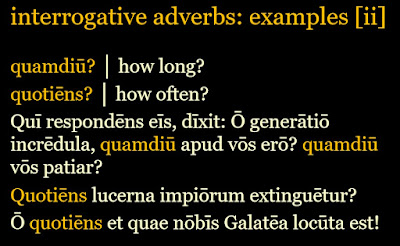https://adckl.blogspot.com/2024/08/180924-adverbs-71-interrogative-adverbs.html
https://adckl.blogspot.com/2024/08/180924-adverbs-72-interrogative-adverbs.html
We will begin with
the interrogative adverbs since they are indeclinable because they do
not refer to nouns or pronouns, but to actions:
Ubi habitās? │ Where do you live?
Quō iērunt mīlitēs nostrī? │To where did our soldiers go? [ = Where
did our soldiers go to?]
Unde vēnistis? │From where have you come? [ = Where have you
come from?]
Quandō adveniet pater tuus? │When will your uncle arrive?
Cūr hoc fēcistī? │ Why have you done this?
Quārē hoc dīxit? │ Why did he say this?
Hoc tū quam ob
rem (or: quamobrem) nōn fēcistī? │For
what reason / why have you not done this?
Quōmodo (or: quō modo) hoc accidere potest? │How can this happen?
Quamdiū? (quam
diū?): How long ago?; For how long?
Quamdiū id factum est? (Plautus) │
How long since did that happen?
Quamdiū manēbit hic mundus, quī in malignō positus
est? │ For how long will this world
remain, which has been placed in the power of evil?
Quī respondēns
eīs, dīxit: Ō generātiō incrēdula, quamdiū apud vōs erō? quamdiū
vōs patiar? (Vugate) │ And, replying to them, he said: “You
unbelieving generation how long shall I stay with you? How long
shall I put up with you?”
Quam diū prō Gereōnī, castellī Āpūliae inopis,
tanquam prō Carthāginis moenibus sedet? (Livy) │ How
long has he been sitting before the walls of Gereonium, a poor fortress in
Apulia, as though they were the walls of Carthage?
quotiēns?: How often?; How many times?
Quotiēns lucerna impiōrum extinguētur? (Vulgate) │
How often is the lamp of the wicked put out?
Quotiēns tandem ēdīxī tibi, ut cavērēs? (Plautus) │How often, I wonder, have I told
you to be cautious?
Ō quotiēns
et quae nōbīs Galatēa locūta est! (Vergil) │ O how
often and what things Galatea has said to me!
Note in the last
example the exclamatory use of the adverb i.e. rather than as a
question.
Translation
practice:
- Unde cucurrērunt tristēs puerī? Ubi nunc sunt?
- Cūr dās praemium laudemque parentibus?
- Quō amnis it?
- Quam ob rem bibunt sanguinem ovis illīus?
- Quandō claudentur portae ingentēs urbis?
- Quō modō moenia nova is aedificābit?
- Quam ob rem nōn potuī vulgō canere?
- Quārē dēfessī estis? Quandō dormiētis?
- Quotiēns dīcendum est tibi?
- Quamdiū iste locuplēs erit?













